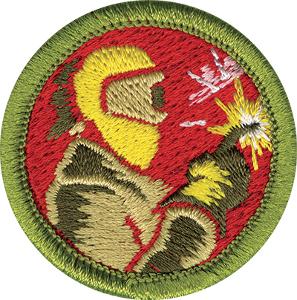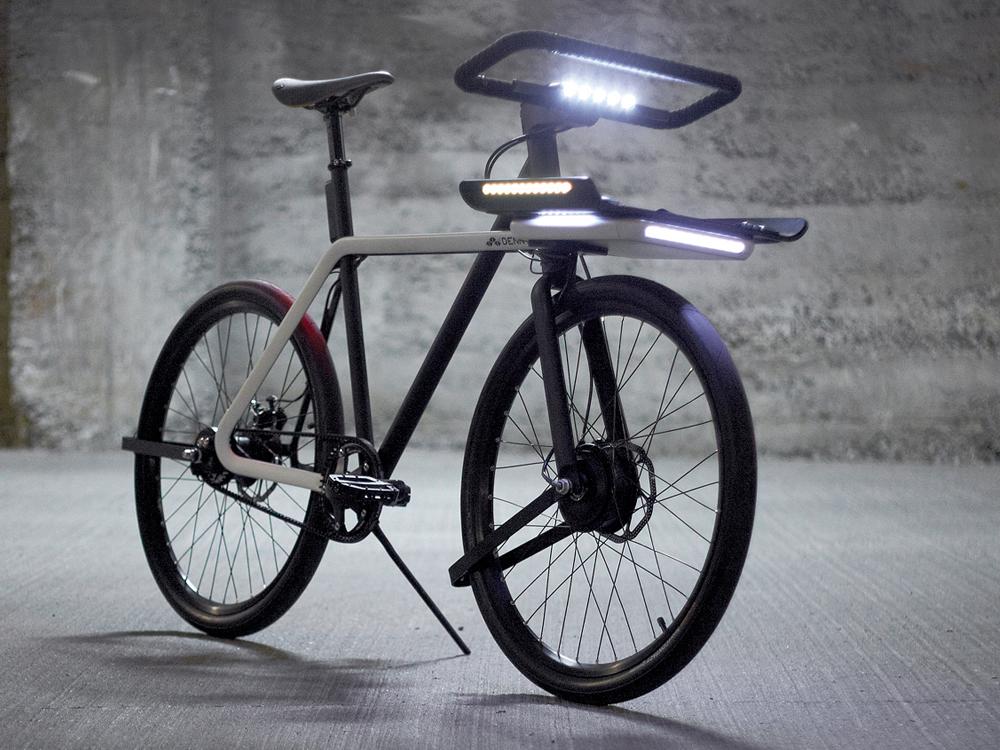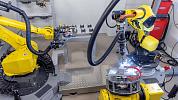- FMA
- The Fabricator
- FABTECH
- Canadian Metalworking
Categories
- Additive Manufacturing
- Aluminum Welding
- Arc Welding
- Assembly and Joining
- Automation and Robotics
- Bending and Forming
- Consumables
- Cutting and Weld Prep
- Electric Vehicles
- En Español
- Finishing
- Hydroforming
- Laser Cutting
- Laser Welding
- Machining
- Manufacturing Software
- Materials Handling
- Metals/Materials
- Oxyfuel Cutting
- Plasma Cutting
- Power Tools
- Punching and Other Holemaking
- Roll Forming
- Safety
- Sawing
- Shearing
- Shop Management
- Testing and Measuring
- Tube and Pipe Fabrication
- Tube and Pipe Production
- Waterjet Cutting
Industry Directory
Webcasts
Podcasts
FAB 40
Advertise
Subscribe
Account Login
Search
From the Web: Bicycle of the future; chocolate + welding; fabricator’s creative boom; and jobs
- By Vicki Bell
- August 19, 2014
Introducing Denny, a prototype bicycle that won Oregon Manifest’s most recent bicycle design competition. The contest paired design firms and bicycle builders from five American cities, and challenged them to make urban cycling more attractive by addressing four common problems: theft, maneuvering rain-slicked roads, navigating traffic, and carrying cargo—be it a laptop bag or a week’s groceries.
Crafted by design firm Teague and bicycle fabricator Taylor Sizemore, Denny’s clever design concepts include a set of handlebars that can be pulled apart and used to secure the cycle in the place of a separate lock. Beyond mimicking the functionality of a traditional U-lock, the design acts as a virtual deterrent, leading potential thieves to wonder where the handlebar is.
Much has been said about the need to introduce young people to manufacturing careers. To this end, a welding merit badge for Boy Scouts was introduced in 2012. Nearly 11,000 Scouts earned the badge in 2013, moving the badge up in ranking from No. 101 in 2012 to No. 55 last year in popularity.
Two dozen Scoutmasters and other adult volunteers from the North Texas area’s Circle Ten Council and Longhorn Council recently participated in a train the trainer session in which they received laboratory instruction in how to safely teach welding basics.
While welding in itself is a pretty exciting exercise, instructors and others in the welding industry are thinking outside the box to make it even more interesting to Scouts. For example, Jason Scales, a welding educational specialist with Lincoln Electric, the company partnering with the BSA to introduce welding to the Scouts, helped conceive the “chocolate welding” program for Cub Scout day camp that started the August.
“Welding is a process of fusing two materials together, and you could do it with paraffin or maybe a few other things, but why not two chocolate bars?” said Scales. “This is about creating an experience where the Scouts can experience welding in a safe environment. There’s a way to do that using chocolate.”
The concept surfaced in Europe and was noticed by members of Lincoln’s educational team, already involved in designing a Welding merit badge for the BSA. For younger boys, the basic process and its uses in the world can be taught using chocolate bars as a stand-in for steel and a bottle of hot water as a heat source. “You melt the edges a little bit and fuse the two together to make one bar,” Scales said. “Depending on the age of the Scouts, it allows us to get into a discussion of some engineering concepts and building shapes.”
To earn the badge, Scouts use regular welding tools to complete a an eagle sculpture from metal.
Although chocolate isn’t involved, Acutech, a one-stop metal manufacturing shop in Columbia Falls, Mont., has put together a unique system to grow its business—working with inventors and companies to create innovative products.
Among its recent project was working with a Flathead Valley, Mont., resident, Jim Wegener to engineer Wegener’s Safety Latch for football helmets, and invention that locks the helmet’s chin strap into place and keeps the helmet from popping off during contact. High school and college teams have already ordered the latches, just in time for the fall season.
Another product the company is developing is the Glacier Guard, an invention from Glacier Guard Innovations and its CEO Matt Folkman, which consists of an engineered aluminum system for roofs to eliminate ice dams through heated panels.
Airbus has launched a third hiring wave for hourly manufacturing jobs at its A320 final assembly line in Mobile, Ala.
The positions cover seven different categories, and the starting hourly training rate ranges from $12 to $16 depending on the job. Specifically, the aircraft manufacturer is seeking candidates for systems installation, cabin interiors, sheet metal specialists, corrosion protectors, ground handling technicians, tool shop attendants, and composite rework specialists.
successful candidates will be placed in training programs led by hiring partner Alabama Industrial Development Training that could lead to employment, but acceptance in the training program does not guarantee a position will be offered. There are no fees associated with the training programs, but enrollees must complete the program on their own time without pay.
Sheet metal specialists will be responsible for the fabrication, assembly and repair of sheet metal equipment products and structures on the aircraft or individual pieces in the workshop. The position requires at least three to five years' experience in the aviation field. The starting hourly training rate is $15 to $16.
Airbus is currently building its first A320 assembly line on U.S. soil at Mobile Aeroplex, expected to figure prominently in the company’s ability to efficiently fill the mounting backlog for the popular single-aisle aircraft. The $600 million facility is slated to come online in 2015, deliver its first Mobile-assembled aircraft the following year and employ about 1,000 people when it reaches full annual production of 40 to 50 aircraft by 2018.
Airbus and other large companies may be hiring, but the small business owner is taking a wait-and-see approach.
According to a CNNMoney-Manta survey released Aug. 19, 28 percent of small business owners said the economy is the "biggest challenge" they're currently facing, topping issues like sales, regulations, and financing.
As noted in an article on money.cnn.com, according to the National Federation of Independent Businesses' monthly survey, many small business owners expect conditions to get worse—not better—in the next six months. And small businesses, like J Machine, a Lake Forest, Calif, manufacturing firm that builds equipment like dental machinery, continues to look for ways to cut costs, like outsourcing manufacturing. Hiring is not on this and many other small businesses’ radar, and won’t be anytime soon if conditions don’t improve.
Manta’s survey also found that 58 percent of small business owners plan to vote for a challenger candidate in the midterm election. Christina Halpain, who manages J Machine, said, “We need to have politicians in office that are looking at the opportunities that small businesses need to flourish.”
subscribe now

The Fabricator is North America's leading magazine for the metal forming and fabricating industry. The magazine delivers the news, technical articles, and case histories that enable fabricators to do their jobs more efficiently. The Fabricator has served the industry since 1970.
start your free subscriptionAbout the Author

Vicki Bell
2135 Point Blvd
Elgin, IL 60123
815-227-8209
- Stay connected from anywhere

Easily access valuable industry resources now with full access to the digital edition of The Fabricator.

Easily access valuable industry resources now with full access to the digital edition of The Welder.

Easily access valuable industry resources now with full access to the digital edition of The Tube and Pipe Journal.
- Podcasting
- Podcast:
- The Fabricator Podcast
- Published:
- 04/30/2024
- Running Time:
- 53:00
Seth Feldman of Iowa-based Wertzbaugher Services joins The Fabricator Podcast to offer his take as a Gen Zer...
- Industry Events
Pipe and Tube Conference
- May 21 - 22, 2024
- Omaha, NE
World-Class Roll Forming Workshop
- June 5 - 6, 2024
- Louisville, KY
Advanced Laser Application Workshop
- June 25 - 27, 2024
- Novi, MI
Precision Press Brake Certificate Course
- July 31 - August 1, 2024
- Elgin,


































